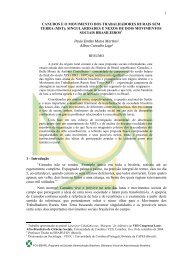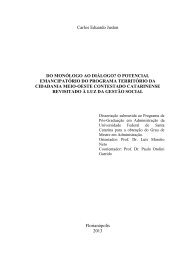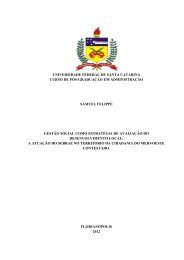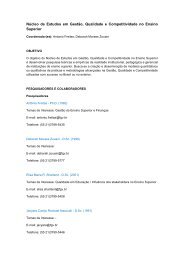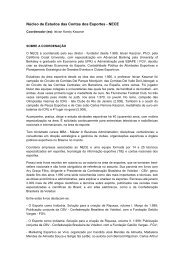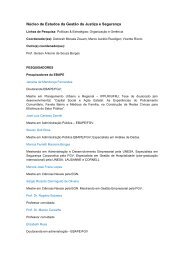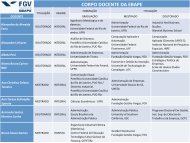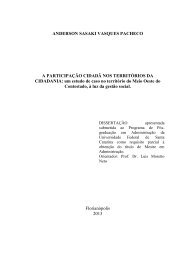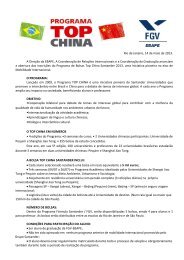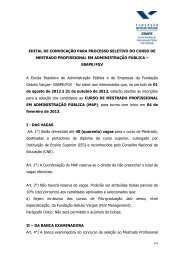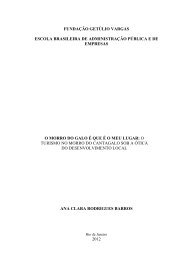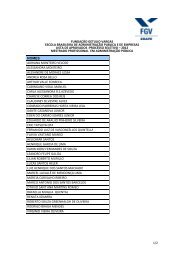Economics of Strategy and Organization» (ESO) - Ebap
Economics of Strategy and Organization» (ESO) - Ebap
Economics of Strategy and Organization» (ESO) - Ebap
You also want an ePaper? Increase the reach of your titles
YUMPU automatically turns print PDFs into web optimized ePapers that Google loves.
EBAPE MSc & Ph.D. Winter Short Courses<br />
Research Seminar - Syllabus<br />
«<strong>Economics</strong> <strong>of</strong> <strong>Strategy</strong> <strong>and</strong> Organization» (<strong>ESO</strong>)<br />
15-19th <strong>of</strong> July 2013<br />
***<br />
Pr<strong>of</strong>essor: Bertr<strong>and</strong> Quélin, HEC Paris<br />
Schedule: July - 15 hours (see schedule)<br />
Teaching language: English<br />
Web site: https://studies2.hec.fr/quelin<br />
Adm. Assistant: Adriana C.V. Carneiro - Tel.: (55 21) 3799·5719<br />
Office hours: on appointment - e-mail: quelin@hec.fr<br />
© Bertr<strong>and</strong> Quélin (HEC Paris) - EBAPE MSc & Ph.D. Winter Short Courses - <strong>Economics</strong> <strong>of</strong> <strong>Strategy</strong> <strong>and</strong> Organization (<strong>ESO</strong>) 1<br />
***<br />
Positioning <strong>of</strong> the MSc <strong>and</strong> Ph.D. seminar<br />
Few years ago, the economics <strong>of</strong> organization arose in response to perceived limitations in the<br />
neoclassical economics (price <strong>and</strong> information mechanisms, equilibrium, signaling…). Since major<br />
contributors won Nobel Prize in economics (Pr<strong>of</strong>. R. Coase in 1991, Pr<strong>of</strong>. D. North in 1993, <strong>and</strong> Pr<strong>of</strong>. E.<br />
Ostrom <strong>and</strong> Pr<strong>of</strong>. O.E. Williamson in 2009).<br />
This research seminar covers some prominent economic theories <strong>of</strong> the firm <strong>and</strong> organizations related to<br />
strategic management <strong>and</strong> business administration. It is entirely devoted to the assessment <strong>of</strong> five different<br />
economic theories that are interested in the strategy <strong>of</strong> firm as well organizational forms. The firm is not a<br />
st<strong>and</strong>-alone entity but is to be examined in relation to the market <strong>and</strong> other modes <strong>of</strong> organizing economic<br />
activities (e.g., franchising, alliances, partnerships, NGO, associations <strong>and</strong> network).<br />
Objectives<br />
This seminar is intended to bring to the MSc <strong>and</strong> Ph.D. students' advanced knowledge in the economics<br />
<strong>of</strong> strategy <strong>and</strong> organization (<strong>ESO</strong>), whatever their background <strong>and</strong> their specialization. It is also devoted to<br />
the most recent theoretical issues. It points to the research tasks in management in overall (marketing,<br />
human resources, finance, strategic management, <strong>and</strong> accounting <strong>and</strong> operation management).<br />
This seminar covers dimensions which one finds in the modern economic analysis <strong>of</strong> the firm like the<br />
coordination between agents, delegation <strong>and</strong> authority, vertical integration <strong>and</strong> hybrid forms <strong>of</strong> organization,<br />
contracts <strong>and</strong> competences.<br />
The theories are approached through their theoretical background, <strong>and</strong> the authors, concepts <strong>and</strong><br />
analytical categories <strong>and</strong> tools. The seminar is about the internal coherence <strong>of</strong> each field or theory. The<br />
assessment <strong>of</strong> each theory is also undertaken in order to <strong>of</strong>fer consequent control <strong>of</strong> analytical tools. This is<br />
done for underst<strong>and</strong>ing well the different cornerstones <strong>of</strong> each selected economic theory <strong>of</strong> the firm.<br />
The selected theories that have taken shape over the past 40 years have vastly exp<strong>and</strong>ed the research<br />
agenda in both economic theory <strong>and</strong> organization theory as well as in management. This seminar is also<br />
interested in the way through the contributions <strong>of</strong> the studied economic theories are integrated into the most<br />
recent research in management.<br />
Pedagogy<br />
Teaching is organized around the critical presentation <strong>of</strong> selected theories <strong>and</strong> the thought <strong>of</strong> the authors.<br />
The preliminary reading by students <strong>of</strong> articles representative <strong>of</strong> the main topics is m<strong>and</strong>ate. Two articles
have to be read <strong>and</strong> studied in advance for each session. A complementary bibliography is provided to<br />
deepen (not m<strong>and</strong>atory).<br />
Each session is organized around an internal analysis <strong>of</strong> the coherence <strong>of</strong> the theory, assumptions,<br />
hypotheses <strong>and</strong> contribution <strong>of</strong> each theory to both economics <strong>and</strong> management. Teaching is thus based on<br />
critical discussion <strong>of</strong> works, analysis <strong>of</strong> articles <strong>and</strong> research tasks. In complement, the seminar is devoted to<br />
the development <strong>of</strong> the economic theories <strong>of</strong> the firm <strong>and</strong> organizations <strong>and</strong>, with the assessment <strong>of</strong> their<br />
potential contribution to research in management.<br />
Organization <strong>and</strong> Frame <strong>of</strong> the seminar<br />
Each session will follow the below format (break included):<br />
- Student presentation (30 mn):<br />
Two students' presentations for each session, limited to 10 minutes each one, will introduce<br />
<strong>and</strong> analyze the two articles selected for the class; one student will ensure a discussion <strong>of</strong> one<br />
<br />
article (10 mn each);<br />
These two presentations, in didactic matter, will be followed by Q&A <strong>and</strong> discussion; this<br />
general discussion <strong>of</strong> the two articles will be limited to 10 minutes.<br />
- Analysis (120 mn): each seminar will be then devoted to a deep analysis to underst<strong>and</strong> internal<br />
coherence <strong>and</strong> the contributions <strong>of</strong> the studied theory; this analysis developed by the pr<strong>of</strong>essor will be<br />
limited to 1 hour.<br />
- New trends <strong>and</strong> further developments (30 mn): the last half hour will be devoted to the recent<br />
developments <strong>of</strong> the theory, the bonds with problems <strong>and</strong> questions <strong>of</strong> research anchored in<br />
management, with a specific focus on strategy; it will rest on an interaction <strong>and</strong> exchanges on the<br />
problems being able to mobilize such or such part <strong>of</strong> the studied economic theory.<br />
Grading<br />
The grades will be:<br />
o Student presentation: 30%<br />
o Oral participation: 20%<br />
o Final written work (term paper): 50%<br />
1. The evaluation <strong>of</strong> the student’s presentations will rest on the clearness <strong>of</strong> the oral presentation <strong>and</strong><br />
the capacity to answer the questions.<br />
It requires the preliminary h<strong>and</strong>ing-over <strong>of</strong> a hard copy <strong>of</strong> the notes or transparencies (to be sent by email<br />
to quelin@hec.fr the day before 10:00 p.m.).<br />
2. The oral participation will take account <strong>of</strong> the relevance <strong>of</strong> lightings, analysis <strong>and</strong> st<strong>and</strong>point<br />
representing a thorough reading <strong>of</strong> the two texts subjected for the preparation <strong>of</strong> the meeting.<br />
3. The term paper will consist <strong>of</strong> a work <strong>of</strong> drafting <strong>of</strong> an analysis relating to an economic topic chosen<br />
by the pr<strong>of</strong>essor in accordance with each student.<br />
This term paper will have to be structured in the following way: after the discussion <strong>and</strong> comparison <strong>of</strong><br />
topics <strong>and</strong> analyses supported by the authors (a third to half <strong>of</strong> the term paper), the term paper will have to<br />
necessarily stress the analysis <strong>of</strong> the issues <strong>of</strong>fered by the economic literature <strong>and</strong> the development for new<br />
tracks for research in management (half to two thirds).<br />
For this purpose, a rigorous step is necessary resulting writing proposals for a research project <strong>and</strong> in<br />
proposing an adequate framework to examine them (half to two thirds <strong>of</strong> written work).<br />
The evaluation <strong>of</strong> the written work will concern the demonstration <strong>of</strong> a good <strong>and</strong> comprehensive<br />
underst<strong>and</strong>ing <strong>of</strong> the mobilized articles <strong>and</strong> the quality <strong>of</strong> the developed prospects for research.<br />
This written work will have to be given to more at the end <strong>of</strong> August 2013 (no later).<br />
© Bertr<strong>and</strong> Quélin (HEC Paris) - EBAPE MSc & Ph.D. Winter Short Courses - <strong>Economics</strong> <strong>of</strong> <strong>Strategy</strong> <strong>and</strong> Organization (<strong>ESO</strong>) 2
Main Topics & Classes (5)<br />
Session #1 – Theory <strong>of</strong> Property Rights<br />
Law <strong>and</strong> economy: Is the definition <strong>of</strong> the Property Rights possible<br />
Sharing the value created in the organizations <strong>and</strong> through the contracts,<br />
Team production <strong>and</strong> information costs,<br />
The functions <strong>of</strong> contracting <strong>and</strong> taking risk,<br />
Difficulties <strong>of</strong> metering outputs <strong>and</strong> monitoring workers,<br />
Property Rights <strong>and</strong> the institutional environment (Internet, free access, <strong>and</strong> wiki-world).<br />
Session #1 - Articles to be read <strong>and</strong> prepared<br />
- Armen A. ALCHIAN & Harold DEMSETZ (1972), “Production, Information Costs, <strong>and</strong> Economic<br />
Organization”, American Economic Review, 62(5): 777-795.<br />
- Oliver HART & John MOORE (1990), “Property Rights <strong>and</strong> the Nature <strong>of</strong> the Firm”, Journal <strong>of</strong> Political<br />
Economy, 98(6): 1119-1158.<br />
Complementary readings (not m<strong>and</strong>atory):<br />
> Field, B.C. (1989), “The evolution <strong>of</strong> property rights”, Kyklos, 42(3): 319-345.<br />
> Anderson, T.L. & Hill B.C. (1990), “The race for property rights”, J. <strong>of</strong> Law & <strong>Economics</strong>, 33.<br />
> Barzel, Y. (1997), Economic analysis <strong>of</strong> property rights, Cambridge U.P., 2 nd edition.<br />
*****<br />
Session #2 - Agency Theories: delegation <strong>and</strong> monitoring<br />
Managerial behavior <strong>and</strong> Agency costs,<br />
Normative approach <strong>and</strong> positive approach,<br />
Training <strong>of</strong> the teams <strong>and</strong> the division <strong>of</strong> the income: fixed payment <strong>and</strong> residual claims,<br />
The question <strong>of</strong> the monitoring <strong>and</strong> the evaluation <strong>of</strong> the efforts,<br />
Costs <strong>of</strong> monitoring <strong>and</strong> motivating agents,<br />
Compromise design <strong>of</strong> the firm <strong>and</strong> the risk,<br />
Renewal <strong>of</strong> the Agency Theory (Corporate governance, governance <strong>of</strong> networks <strong>and</strong> communities,<br />
multiple principals…).<br />
Session #2 - Articles to be read <strong>and</strong> prepared<br />
- Michael J. JENSEN & William H. MECKLING (1976), “Theory <strong>of</strong> the Firm: Managerial Behavior,<br />
Agency Costs <strong>and</strong> Ownership Structure”, Journal <strong>of</strong> Financial <strong>Economics</strong>, 3(4): 305-360.<br />
- Eugene F. FAMA & Michael C. JENSEN (1983), “Agency Problems <strong>and</strong> Residual Claims”, Journal <strong>of</strong><br />
Law & <strong>Economics</strong>, XXVI, 1-29.<br />
Complementary readings (not m<strong>and</strong>atory):<br />
> Fama, E.F. (1980), “Agency problems <strong>and</strong> the theory <strong>of</strong> the firm”, Journal <strong>of</strong> Political Economy,<br />
88(2): 288-307.<br />
> Fama, E.F., & M.C. Jensen (1983), “Agency problems <strong>and</strong> residual claims”, Journal <strong>of</strong> Law <strong>and</strong><br />
<strong>Economics</strong>, 26, 327-350.<br />
> Eisenhardt, K.M. (1989), “Agency theory: an assessment”, Academy <strong>of</strong> Management Review,<br />
14(1): 57-74.<br />
> Harold Demsetz (2008), “Frischmann’s View <strong>of</strong> “Toward a Theory <strong>of</strong> Property Rights””, Review<br />
<strong>of</strong> Law <strong>and</strong> <strong>Economics</strong>, 4(1): 128-132.<br />
> Sanford J. GROSSMAN & Oliver D. HART (1986), “The Costs <strong>and</strong> Benefits <strong>of</strong> Ownership: A<br />
Theory <strong>of</strong> Vertical <strong>and</strong> Lateral Integration”, Journal <strong>of</strong> Political Economy, 94(4): 691-719.<br />
> Oliver Hart & John Moore (1990), "Property Rights <strong>and</strong> the Nature <strong>of</strong> the Firm", Journal <strong>of</strong><br />
Political Economy, 98(6): 1119-1158.<br />
© Bertr<strong>and</strong> Quélin (HEC Paris) - EBAPE MSc & Ph.D. Winter Short Courses - <strong>Economics</strong> <strong>of</strong> <strong>Strategy</strong> <strong>and</strong> Organization (<strong>ESO</strong>) 3
Benjamin KLEIN & Keith B. LEFFLER (1981), “The Role <strong>of</strong> Market Forces in Assuring<br />
Contractual Performance”, Journal <strong>of</strong> Political Economy, 89(4): 615-641.<br />
*****<br />
Session #3 - Frontiers <strong>of</strong> the firm <strong>and</strong> Transaction Cost <strong>Economics</strong>: the approaches <strong>of</strong> R. Coase <strong>and</strong><br />
O.E. Williamson<br />
Explaining the existence <strong>and</strong> scope <strong>of</strong> the firm,<br />
Firm as a consequence <strong>of</strong> the costs <strong>of</strong> market transactions,<br />
Market <strong>and</strong> organization: the Market/Hierarchy dichotomy,<br />
Determining the governance: ownership <strong>and</strong> direction, forms <strong>of</strong> organization,<br />
Attributes <strong>of</strong> the transactions,<br />
Vertical integration <strong>and</strong> hybrid organizational forms,<br />
Incentives <strong>and</strong> coordination: Holdup <strong>and</strong> opportunism <strong>of</strong> the agents,<br />
Organizational arrangements <strong>and</strong> institutional environment,<br />
Authority in the firm <strong>and</strong> Bureaucratic costs,<br />
Limits <strong>of</strong> the efficiency <strong>of</strong> the organizations,<br />
Is the Transaction Cost <strong>Economics</strong> useful for management<br />
Session #3 - Articles to be read <strong>and</strong> prepared<br />
- Oliver E. WILLIAMSON (1981), “The Modern Corporation: Origins, Evolution, Attributes”, Journal <strong>of</strong><br />
Economic Literature, 19(4): 1537-1568.<br />
- Oliver E. WILLIAMSON (1991), “Comparative Economic Organization: The Analysis <strong>of</strong> Discrete<br />
Structural Alternatives”, Administrative Science Quarterly, 36(2): 269-296.<br />
Complementary readings (not m<strong>and</strong>atory):<br />
> Ronald H. COASE (1937), “The Nature <strong>of</strong> the Firm”, Economica, 4(16): 386-405.<br />
> COASE R. (1972), “Industrial Organization: A proposal for Research”. In Fuchs V.R., Ed., Policy<br />
Issues <strong>and</strong> Research Opportunities in Industrial Organization. NBER, New York.<br />
> Oliver E. WILLIAMSON (1989), “Transaction Cost <strong>Economics</strong>” in R. Schmalensee <strong>and</strong> R. D.<br />
Willig (eds.), H<strong>and</strong>book <strong>of</strong> Industrial Organization, Elsevier Publishers, 1 Chap. 3, 135-182.<br />
> Williamson, O.E. (1991), "Strategizing, economizing, <strong>and</strong> economic organization", Strategic<br />
Management Journal, 12, pp.75-94.<br />
> Simon, H. (1991), “Organizations <strong>and</strong> markets”, Journal <strong>of</strong> Econ. Perspectives, 5(2), pp.25-44.<br />
*****<br />
Session #4 - Private Costs, Social Costs <strong>and</strong> Transaction Costs: The Coase Theorem<br />
Market <strong>and</strong> firm: their respective functions,<br />
Private costs, social costs: the theorem <strong>of</strong> Coase,<br />
Property Rights as basis <strong>of</strong> the exchange,<br />
The tragedy <strong>of</strong> commons,<br />
Genesis <strong>of</strong> the regulation <strong>and</strong> creation <strong>of</strong> new markets (public goods, NGO),<br />
Social costs <strong>and</strong> common pool.<br />
Session #4 - Articles to be read <strong>and</strong> prepared<br />
- Ronald H. COASE (1960), “The Problem <strong>of</strong> Social Cost”, Journal <strong>of</strong> Law <strong>and</strong> <strong>Economics</strong>, 3, 1-44.<br />
- Fred S. McChesney (2006), “Coase, Demsetz <strong>and</strong> the unending externality debate”, Cato Journal, 26(1)<br />
(Winter).<br />
Complementary readings (not m<strong>and</strong>atory):<br />
© Bertr<strong>and</strong> Quélin (HEC Paris) - EBAPE MSc & Ph.D. Winter Short Courses - <strong>Economics</strong> <strong>of</strong> <strong>Strategy</strong> <strong>and</strong> Organization (<strong>ESO</strong>) 4
Granovetter, M. (1999), “Coase encounters <strong>and</strong> formal models: Taking Gibbons seriously”,<br />
Administrative Science Quarterly, 44: 158-162.<br />
> Madhok, A. (2002), “Reassessing the fundamentals <strong>and</strong> beyond: Ronald Coase, the transaction<br />
cost <strong>and</strong> Resource-based theories <strong>of</strong> the firm <strong>and</strong> the institutional structure <strong>of</strong> production”, Strategic<br />
Management Journal, 23: 535–550.<br />
> Elodie Bertr<strong>and</strong> (2006): “The Coasean analysis <strong>of</strong> lighthouse financing: myths <strong>and</strong> realities”,<br />
Cambridge Journal <strong>of</strong> <strong>Economics</strong>, 30, 389–402.<br />
*****<br />
Session #5 – New Institutional <strong>Economics</strong> <strong>and</strong> Sustainable Growth<br />
Institutional environment <strong>and</strong> private contracts,<br />
The transactional sector <strong>and</strong> the "visible h<strong>and</strong>",<br />
The incompleteness <strong>of</strong> contracts <strong>and</strong> their opposable character with the common right,<br />
Transactions <strong>and</strong> economic development: privatizations, regulations,<br />
Economic growth <strong>and</strong> institutions.<br />
Session #5 - Articles to be read <strong>and</strong> prepared<br />
- Douglass C. NORTH (1991), “Institutions”, Journal <strong>of</strong> Economic Perspectives, 5(1), 97-112.<br />
- Avner Greif, Paul Milgrom, <strong>and</strong> Barry R. Weingast (1994), “Coordination, Commitment, <strong>and</strong><br />
Enforcement: The Case <strong>of</strong> the Merchant Guild”, Journal <strong>of</strong> Political Economy, 102(4): 745-776.<br />
Complementary readings (not m<strong>and</strong>atory):<br />
> North D. (1981), “Structure <strong>and</strong> Performance: The Task <strong>of</strong> Economic History”, Journal <strong>of</strong><br />
Economic Literature, 16, p. 963-978.<br />
> North, D.C., & Weingast, B.R. (1989), “Constitutions <strong>and</strong> commitment: The evolution <strong>of</strong><br />
institutions governing public choice in seventeenth-century Engl<strong>and</strong>”, Journal <strong>of</strong> Economic History.<br />
44(4): 803-832.<br />
> North, D.C. (1990). Institutions, Institutional change <strong>and</strong> Economic performance. Cambridge,<br />
MA: Cambridge University Press.<br />
> Douglass C. NORTH (1990), “Informal Constraints”, Institutions, Institutional Change <strong>and</strong><br />
Economic Performance, Cambridge University Press, 36-60.<br />
> Levy, P., & Spiller, P.T. (1996). Regulations, Institutions, <strong>and</strong> Commitment. Cambridge, MA:<br />
Cambridge University Press.<br />
*****<br />
Textbook<br />
- Mahoney, J.T. (2005), Economic Foundations <strong>of</strong> <strong>Strategy</strong> - Sage Publications.<br />
Recommended Complementary Readings<br />
- Brousseau, E. & Glachant J.M. (2002), The <strong>Economics</strong> <strong>of</strong> Contract – Cambridge University Press.<br />
- Brousseau, E. & Glachant J.M. (2008), New Institutional <strong>Economics</strong> – Cambridge University Press.<br />
- Buckley, P.J. & Michie, J. (1996), Firms, Organizations <strong>and</strong> Contracts: A Reader in Industrial<br />
Organization (Oxford Management Readers) – Oxford University Press.<br />
- Milgrom, P. & Roberts J. (1992), <strong>Economics</strong>, Organization <strong>and</strong> Management - Prentice Hall Business<br />
Publishing. Trad. Fr.: Economie, Organisation et Management – PUG/De Boeck (1997).<br />
- Putterman, L. (ed.) (1986), The Economic Nature <strong>of</strong> the Firm: A Reader – Cambridge University Press.<br />
Schedule<br />
Pr<strong>of</strong>. Bertr<strong>and</strong> Quélin - The <strong>Economics</strong> <strong>of</strong> <strong>Strategy</strong> <strong>and</strong> Organization<br />
July 15th to 19th: 9:00 to 12:00 AM<br />
FGV – EBAPE – Rio de Janeiro<br />
© Bertr<strong>and</strong> Quélin (HEC Paris) - EBAPE MSc & Ph.D. Winter Short Courses - <strong>Economics</strong> <strong>of</strong> <strong>Strategy</strong> <strong>and</strong> Organization (<strong>ESO</strong>) 5



